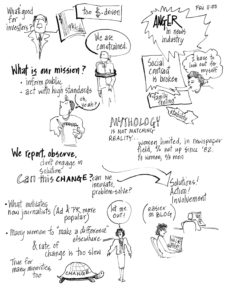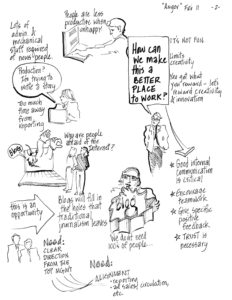Convener: Dale Peskin
Participants
Jarah Euston
Stacy Lyech
Melinda Wttston
Ralph
Jan Schaffer
Discussion
I hate my company, it doesn’t listen to me
Who’s editing this? Hating what I read.
Us/them, I’m not in control of my own destiny.
There’s a disconnect between worry over the bottom line and the conversations about where journalism is going. Handwringing over what is happening and not enough looking at what we can do.
Social contract broken- no longer go to work for one company to do good work. Now have to worry about health insurance, job, always looking out for “me”.
Muroch- Melinda was a media correspondent in London told to be independent and let rip and she did and it was cool. Times circ began to overtake the independent. When it didn’t suit him she was promoted into a job she didn’t want. Business interest of the paper vs the editorial value of the paper. Lots of editorial turnover makes everyone on edge.
Some of the news that needs to be covered is not so appealing to some journalists. Tension of mission versus professional success.
Are mission statements genuine? All are the same, are they real or are they marketing tools? Few people running companies have had few experiences as journalists at all.
Internal narrative in newsroom in conflict. Very destablizing. Mythology of newsroom not what its cracked up to be. Causing people to say this is not what I’ve signed up for. Percentage of women in newspapers has not changed since 1982.
TV and radio have fared better for women. Men anchors have been pushed to the background.
What can journalism do? There’s a conundrum with reporters as perpetual bystanders. We don’t engage in solutions. Newsrooms need to rethink themselves as dispassionate observer- and you turn them into problem solvers?
You can try and change things form within or you can leave and start something new.
What’s going on in new media, where there is a clear conversation of what people stand for. Wear objectivity on your sleeve and people can spam it discuss it or support it. Traditional news organizations very disingenuous about that. PR agencies trying to spin the story. Edlmann PR and Walmart successfully planted stories about walmart- if only Walmart was FEMA.
Read the stories with a feeling of suspicion. Part of walmarts motivation was marketing but there was also social entrepreneurship. They gave $28m off the bat.
Why are people going into journalism. 80% of mass comm students are going into PR and advertising. Ratio of j school women/men is 2/3, ratio of newsrooms is 1/3
After three years do you really like it enough? Stacy- a lot of women are saying I can do other things. I don’t have to work nights and work 60 hours to make a difference.
Dale- young people in newsrooms 80% of under 30’s want out of the newsroom bc the companies don’t get it. Learning newsroom survey.
Stacy-young people say the rate of change is just too slow. People just get nailed and are scared to but new stuff out there. Have to have 50 meetings to try something new
Dale- have selective memory about the past of journalism. Most of it wasn’t all that great with sexists and tyrants.
How can you make these better places to work?
Ralph- is it fun anymore, how do we make it fun but not looking backward because it’s not the same anymore. People forget about all the shit we had to put up with. If you’re straight jacketing into rules and expectations it’s not fun
Melinda- how enlightened are managements? People do better work when they’re happy. Some managers are afraid to empower people.
Stacy- how much control to managers need? Administrative stuff sucks the fun out of the day. Need a new class of administrators.
Management by accounting. Detroit. 65% of all hours dedicated to administration, not reporting. Tack on administration to whoever’s job
Journalism needs to innovate but is stifling innovation.
Jane- are baby boomers the problem? Are they too controlling? New gen y very optimistic- they’re too jr and they aren’t listened too. Not given the authority to make the difference.
Melinda that’s why she went with a startup and she empowers her journalists. First two years didn’t have an office just cell phones and laptops. Now with an office no one has a set desk sit where there’s an open computer and it fosters a little team spirit. Teaching each other so other’s can fill in
J lab citizen’s initiative. Lots of anger, people feeling like they weren’t covered. Dissatisfaction.
Dale- trust is a big word
Low threshold now for technology. It’s cheap and easy.
Stacy- if we were staring a newsroom today are these the 450 ppl we would chose? No of course not.
Dale- maybe we don’t need 450 people. Talking to a vc don’t need all that, just need 2 servers.
Stacy- that’s crap!
Ralph- in terms of guiding people it starts at the top. World had a total culture shift
Need clarity and certainty, it starts at the top.
Jane- You’re a non union shop. You can say you’re either with us or against us.
What if you had a biz model with no reporters but just an editor, a magazine model.
Dale- not just newspapers, BBC has 38k employees in 25 yrs 25k.
Melinda- shrinking number of papers. People complain about one newspaper towns, lack of competition, who’s watching?
Jane- vintagesoup.com
Dale- I think people are better informed now than ever before. Moved to Washington and subscribed to the post and found that I didn’t need it.
Stacy- in smaller towns there is nothing- if there’s not one local outfit you don’t know what’s going on in that town. 60% of news in the world is inherently local. The info won’t fall from the sky
Dale I live in reston and I have more information than I can handle, 3 papers, 2 cj sites, blogs…
Stacy- where does news come from? What is the beginning? Conversation and the people reacting . what’s going on who’s here? What is the school calendar and what are their phone numbers?
Jane- added value is what does it mean to me?
Melinda- need to connect the dots, be an eyewitness,
